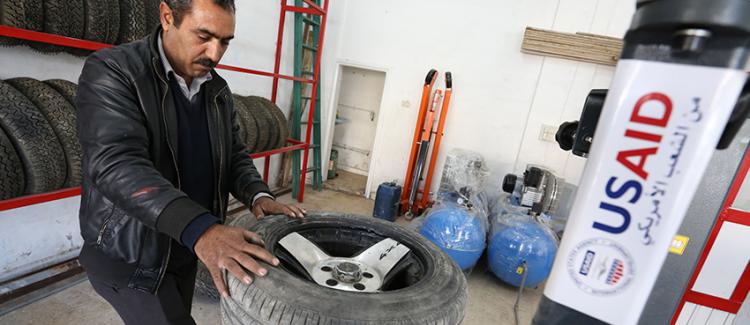Development Challenge
There are numerous links, both directly and indirectly, between the transport sector and development. It is widely acknowledged that the sector plays a vital role in economic growth. Economically developed countries usually have a strong and efficient transportation sector.
One of the largest transportation subsectors in Jordan is the auto services industry. It is estimated that between 30,000 and 50,000 mechanics operate in the kingdom, providing services to more than 1.4 million vehicles. The vast majority of those mechanics are informal Micro and Small Enterprise (MSEs). Preliminary research has identified two major challenges that are holding back growth in the auto services sector: 1) The lack of trust; and 2) the lack of information in both the supply and demand sides of the market.
On a policy level, the Jordanian government passed a regulation in 2014 requiring commercial vehicle drivers to acquire new certifications that guarantee international standards.. MSEs in the transport sector face substantial obstacles associated with meeting these requirements.In regards to the trucking industry, individual ownership/ informality is dominant. According to data obtained from the Drivers and Vehicles Licensing Department (DVLD), there are around 20,000 trucks in Jordan 70% of which are individually owned.
USAID LENS Work
USAID LENS is partnering with the National Guild for Mechanical Professions (GUMP) to support the upgrading and professionalization of the auto services sector to build trust/transparency and, as a result, increase the sales of and introduce more services to increase value for customers.
In addition, USAID LENS is cooperating with the Land Transport Regulatory Commission (LTRC) to design and implement a project to help micro and small enterprises mitigate the risks posed by the implementation of these new regulations. As part of the several activities of the project, USAID has procured consultancy services to help LTRC in developing an internationally compatible curriculum and in establishing a Trainer Certification unit within LTRC to be responsible for certifying training centers and maintaining a training curriculum to support MSEs in meeting these new regulations. The concept was formulated in order to help micro and small companies acquire the know-how to adapt to these regulations, acquire relevant certifications and create new business opportunities for certified training centers and mechanics.
USAID LENS is also working on partnering with the syndicate of trucks owners to develop a support program that will target truckers who are willing to do business collectively, whether by merging into a company or a coalition. The main objective is to make it easier for truck owners to register their business as companies or merge into coalitions in order to professionalize the industry.
Main Achievements
-
Signing of an agreement in August 2015 between USAID LENS and the Land Transport Regulatory Commission (under the umbrella of the Ministry of Transport) to develop an internationally compatible training curriculum on new government-mandated regulations for MSEs in the transport sector.
-
Completed in November 2015 in partnership with LTRC4 modules of training for MSEs in the transport sector to meet international requirements, including modules on passengers, freight and dangerous goods in addition to a certified management professional program.
- Published in December 2015 an RFP to conduct a market segmentation study on sub-segments to guide MSEs in the mechanics sector and improve their services. This is the first phase of the project related to supporting the upgrading and professionalization of the auto services sector in partnership with GUMP.
- Developed in January 2016 an RFA (grant opportunity) of a support program that will target individual truckers in order to encourage them to merge into a company or a coalition.
- The first phase of the National Training Program for MSEs in the Transport Sector was completed last month, reaching more than 1,000 MSEs (mostly informal, individual truckers). The next phase of the program, which is currently underway, will reach an additional 2,000 MSEs mostly in more remote and underserved areas. By July 2017, USAID LENS will have conducted trainings in all 12 governorates. This training program certifies MSEs to access regional and European markets – these requirements were only previously being met by large shipping companies and threatening the survival of small businesses in the Jordanian transport sector as a result. The mandatory training and certification was designed by USAID LENS and is now enforced by the Land Transport Regulatory Commission, ensuring that the most vulnerable of truckers are not negatively burdened by new international regulations affecting the sector. A byproduct impact of this program is that for the first time, LTRC, the government agency responsible for developing and regulating the sector, is now capable to manage and sustain a training program thanks to the foundation built so far (curriculum, certified trainers, and new regulations). As the nation-wide training continues in 2018, 5,000 truck drivers and operators from all over Jordan have benefitted from the program so far, with noticeable changes in revenue and an improvement in the overall quality of services. Rami’s center alone has trained over 250 drivers operating all types of vehicles, with a focus on truck and bus driver, since the launch of the training program in 2017.




